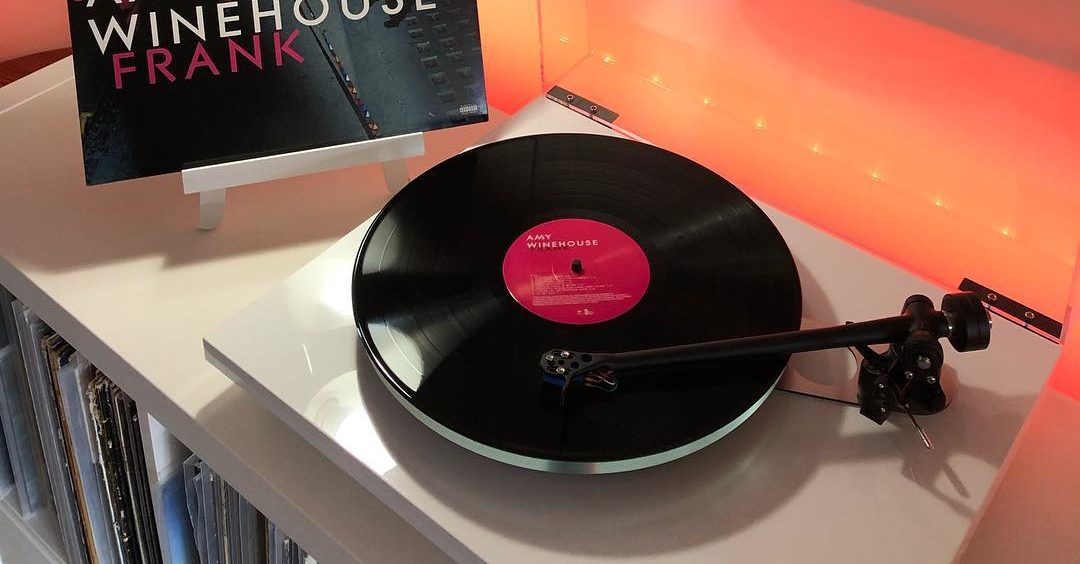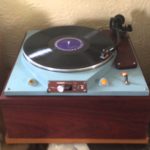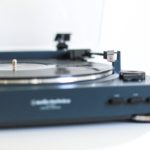Last Updated on March 15, 2023
When it comes to playing records on the turntables, one of my pet peeves is when I heard those irritating fuzzy sound that causes me to have a bad time listening to records. It can be classics such as The Beatles – Revolver, or even records from Bob Dylan, but all of these classics will sound bad when you add in even a tinge of fuzziness. It is equally perplexing, given that I have dedicated a huge amount of time trying to keep my vinyl and the turntable in the best pristine condition.
What Causes The Fuzzy Sound In The Records
When the problem of the fuzzy sound came about, I dug deeper to find out what is the exact reason that causes the fuzzy sound. If you are quick on your feet to think that it must be due to the record itself (there might be scratches on it) or the turntable might be faulty, you might just have hit the nail on the head.
So broadly, there are just three possible reasons why there is a fuzzy sound on the records.
- Faulty turntable
- Records issue
- Wrong placement of the player
Let us take a look deeper into each of this and find out how exactly you can rectify the problem.
1. Fuzzy Sound Due To Faulty turntable
More often than not, the cartridge and hence the stylus will be the main cause of the fuzzy sounds that are coming from your cartridge. According to a former on Stereophile, the presence of the fuzzy sound from the records can be due to the cartridge inability to track the grooves on the records accurately. It is very possible that the tracking force of the cartridge and hence the stylus is too light that causes this issue. This will cause the fuzzy sound, and it can possibly damage your records too.
As a general guide, to solve this fuzzy sound due to the tracking force being too light, all you have to do is to ensure that the tracking force dial is set to zero and that the cartridge and arm should be hovering above the records. Once this is done, set the tracking force to 2 grams or more, and the fuzzy sound should be gone.
If the problem persists, then the problem has to be due to a faulty stylus. If that is the case, check if there is dust on the stylus itself, as the presence of dust on the diamond tip of the stylus can impact its performance. To solve this, you can either use a special stylus brush or even a stylus cleaner solvent to remove the dust itself. If need to, you can also opt to change the stylus to a more reliable brand.
As a note of precaution, when you wish to clean the stylus, never band it from side to side as it will damage to the shaft itself. You should always bring the stylus to the local shop to do a check on it after about 1000 to 1500 hours of playing time.
2. Fuzzy Sound Due To Problems With The Records
If the turntable or the record player is working fine, then the problem of the fuzzy sound must be due to the problems with the records itself. And one of the causes of the fuzzy sound from the records might be due to the accumulation of dust on the records itself! If the records are dirty, then even the best stylus might not be able to track on the grooves present in the records itself. To solve this, you should just purchase a good cleaning brush that can help you clean the records so that any dust or particles can be removed from the grooves itself. Note that most new vinyl records sound fuzzy, and this is because of the accumulation of dust and particles from the manufacturing process itself. So you should always ensure that you give your new vinyl a good cleaning before you play it on your player.
3. Wrong Placement Of Player
Just so you know, it is recommended that you place your record player on a stable footing that is devoid of any possible movements. One such place is actually on your desk whereby even the typing on the keyboard will have an effect on the sound itself. Obviously, you shouldn’t place it on top of vibration causing items, which includes your speakers, subwoofers or even on your bed. You can always purchase a good turntable mat that can help to dampen any vibrations too.
What If The Record Player Sounds Muffled Or Tinny
If the sound that you are hearing is not fuzzy, but instead it sounds muffled, then most likely it is a problem of the cartridge not being aligned. This is a very common problem that can occur for most brand new turntables that you might have purchased. Before you go about scratching your head on how to solve this alignment issue, it is actually a very simple problem that you can solve. All you have to do is to download some free cartridge alignment tool that you can easily find online. A quick search on Google showed that a website called Enjoythemusic does provide a free download to the cartridge alignment tool.
For the case of a tinny sound coming from the record player, the problem (yes you guessed right) is with the cartridge itself. Try the alignment process that I have highlighted above, and if the problem persists, then it is time that you purchase a good pair of speakers that can project the sound.
Cleaning Your Records
Cleaning your records is the first step in improving sound quality and reducing fuzzy sounds. Here are some tips for cleaning your records:
- Choosing the Right Cleaning Solution There are many commercial cleaning solutions available, but you can also make your own with a mixture of distilled water and isopropyl alcohol. Avoid using tap water or soap, as they can leave residue on your records.
- Using a Record Brush A record brush is a great tool for removing dust and dirt from your records. Gently run the brush along the grooves of the record in a circular motion.
- Wet Cleaning For more thorough cleaning, you can use a wet cleaning method. Apply your cleaning solution to a microfiber cloth and gently wipe the record in a circular motion. Be sure to remove any excess liquid with a dry cloth.
- Drying Your Records After cleaning, let your records air dry completely before playing them. Avoid using a hairdryer or other heat source to speed up the drying process, as this can damage your records.
Cleaning Your Turntable
Cleaning your turntable is just as important as cleaning your records, as a dirty turntable can contribute to fuzzy sounds. Here are some tips for cleaning your turntable:
- Dusting Your Turntable Use a soft-bristled brush or a microfiber cloth to gently dust your turntable. Be sure to remove any dust or debris from the stylus (needle) as well.
- Cleaning the Stylus The stylus is the most delicate part of your turntable, so it’s important to handle it with care. Use a stylus cleaning brush or a magic eraser to gently clean the stylus. Be sure to clean it from back to front, never side to side.
- Checking Your Turntable Belt If your turntable has a belt, be sure to check it for wear or damage. A worn or damaged belt can cause fuzzy sounds and affect speed accuracy. Replace the belt if necessary.
Adjusting Your Cartridge and Tonearm
Your turntable’s cartridge and tonearm also play a role in sound quality, so it’s important to ensure they’re properly aligned and adjusted. Here are some tips:
- Checking Cartridge Alignment Use a cartridge alignment tool to ensure your cartridge is properly aligned. Incorrect alignment can cause distortion and fuzzy sounds.
- Adjusting Tracking Force Tracking force is the amount of pressure the stylus exerts on the record. It’s important to set it correctly, as too much or too little pressure can cause fuzzy sounds. Check your turntable’s manual for instructions on how to adjust tracking force.
- Adjusting Anti-Skate Anti-skate is a feature that helps keep the stylus centered in the groove. Incorrect anti-skate settings can cause fuzzy sounds and tracking problems. Check your turntable’s manual for instructions on how to adjust anti-skate.
Storing Your Records Properly
Proper storage is crucial for maintaining the quality of your records and reducing fuzzy sounds. Here are some tips for storing your records:
- Choosing the Right Storage Solution Store your records in a cool, dry place, away from direct sunlight and extreme temperatures. Avoid storing them in plastic sleeves or covers, as these can cause static and attract dust.
- Avoiding Direct Sunlight and Extreme Temperatures Direct sunlight and extreme temperatures can cause warping and damage to your records. Store them in a room with consistent temperature and humidity levels.
- Keeping Records Vertical Store your records vertically, not stacked on top of each other. This helps prevent warping and damage to the grooves.
Frequently Asked Questions (FAQs)
- How often should I clean my records?
It’s recommended to clean your records before and after each use. If you notice fuzzy sounds or other issues, you may need to clean them more frequently. - Can I use soap and water to clean my records?
No, it’s not recommended to use soap and water to clean your records, as they can leave residue and damage the grooves. - How do I know if my turntable belt needs replacing?
If your turntable belt is worn or damaged, you may notice slower or inconsistent speed, or fuzzy sounds. Check your turntable’s manual for instructions on how to replace the belt. - Can I store my records in plastic sleeves?
It’s not recommended to store your records in plastic sleeves, as they can cause static and attract dust. Instead, store them in paper sleeves or on a shelf.
Wrapping Things Up
As you can see, the problem of the fuzzy sound in records is something that can be easily solved by you. All you have to do is to ensure that the placement of the records is on a stable area and that the records itself are clean. Of course, the main bulk of the problem might come from a faulty stylus or cartridge, which you will need to replace in order to hear those crisp and clear sound that is devoid from any fuzzy sounds!
If you need further help, you can watch the following video to have a good overview of how to get a good quality sound from your turntable.



